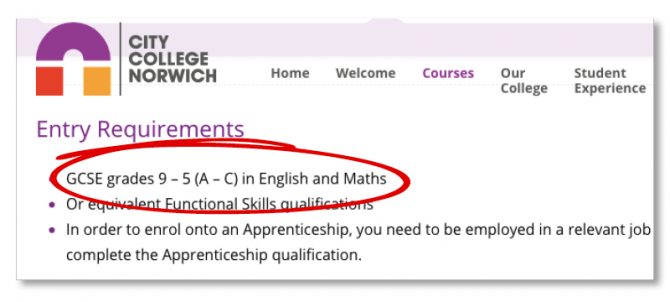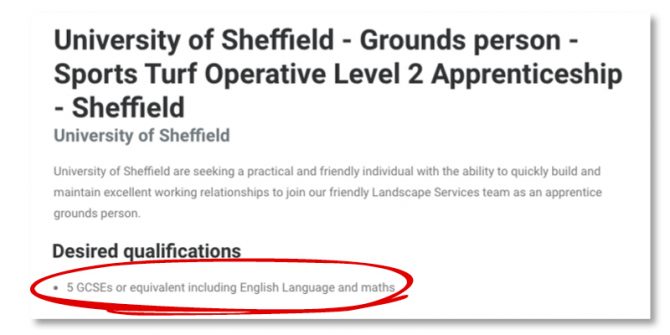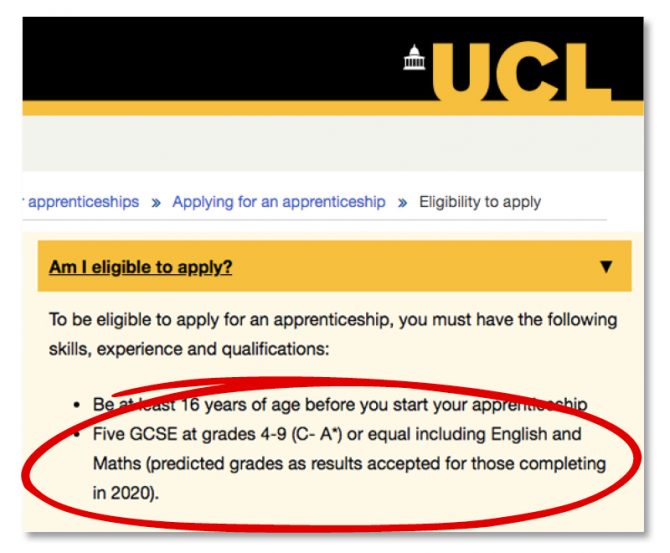Employers are allowed to set their own entry criteria for apprenticeships, even though officially, no formal qualifications are needed. When is the bar being set too high? asks Jess Staufenberg
The government has two favourite phrases for its ambitions in further education, and for apprenticeships in particular.
The first is ‘employer-led’. The term, bandied about constantly by ministers, had its latest big outing in the recent Skills for Jobs white paper. But the approach prompted changes to apprenticeships from 2016, when the old apprenticeship ‘frameworks’ – designed by awarding bodies – were gradually replaced by the new, tougher apprenticeship ‘standards’ – designed by employers. Any hint that an employer-led system can be troublesome (see delays to the new standards as employers struggled to get them ready) has done nothing to put ministers off.
The second phrase is ‘levelling up’, used widely across all departments to describe the government’s ambitions post-Covid.
In a way, apprenticeships are where the ‘employer-led’ and ‘levelling-up’ agendas meet. For a young person without GCSEs, or an adult made redundant, apprenticeships put the learner on a path from level 2 to level 7 to earn and qualify without taking on the debt of a degree. And what could be more employer-led than an apprenticeship?
Yet the latest data has caused concern. Only 31 per cent of apprenticeship starts were at level 2 last year, down from 65 per cent in 2013/14. Starts among 17-year-olds dropped the most, with 26 per cent fewer in 2019/20 than the year before.
Meanwhile chancellor Rishi Sunak’s strategy of handing over £3,000 to employers per apprentice regardless of age this month was strongly criticised, with experts warning increased funding should have gone only to 16-24-year-olds, because it is young people that employers appear most reluctant to hire.
Individual employers will set the selection criteria for their apprenticeships
Now FE Week can reveal some of the high qualification requirements young people have to meet too. The tension is seen on the DfE’s Institute for Apprenticeships website: “Apprentices without level 1 English and maths will need to achieve this level […] prior to taking the end-point assessment”. Apprentices should also work towards their level 2 English and maths.
In other words, apprentices without level 1 functional skills, equivalent to a GCSE 2 or 3, can still do an apprenticeship and will be supported by their training provider to gain it during the course. They will also work towards a level 2 in English and maths, equivalent to a GCSE pass 4.
But the standards then state: “Individual employers will set the selection criteria for their apprenticeships”. There is no law or guidance that prevents an employer (or, indeed, training provider) from setting the selection criteria they like.
Should there be? Where is the line?
FE Week found significant variation in apprenticeship adverts. First off are the apprenticeships that state GCSE passes are “preferable” or “desirable”, rather than deal-breakers. In most cases, the training provider says these are the employer’s criteria – for instance, an engineering operative level 2 apprenticeship advertised by training provider Gen2, which belongs to the City & Guilds group, warns employers will “typically” want “three GCSEs at grade C or higher”.

But in other vacancies, the entry criteria have been set by a college, not the employer. An advert for a countryside worker level 2 apprentice with construction employer DTMS Group, delivered with Craven College in north Yorkshire, states “candidates will ideally have at least 4 GCSEs at grades A* – C/9 – 4”.
When asked, a DTMS spokesperson said, “I don’t agree that there should be a minimum GCSE requirement that stops the less academic from applying, as long as they realise further study will be required during the apprenticeship.” He added: “On the most recent occasion, the college set the entry requirements”.
Richard Swires, apprenticeship manager at Craven College, said it “has no specific entry requirements for apprentices and this is why the advert indicates ‘ideally’”. He added that “in the instance of […] this vacancy, of the last five apprentices to successfully achieve, only one had four GCSEs and four had maths and English at below level 1”.
This is reassuring, but if the employer is not demanding that “ideally” apprentices have four GCSEs, why include it in the advert? Research shows that candidates can be put off by roles asking for “desirable” qualifications they don’t have.
One advert at City College Norwich sets the bar yet higher. For an accounts and finance assistant level 2 apprenticeship, the college gives an entry requirement of “GCSE grades 9 -5 (A – C) in English and maths”. The entry criteria here is a ‘strong’ pass 5 rather than a ‘standard’ pass 4, which is a C+ rather than a C- although it adds an apprentice without these can attend functional skills classes.

A City College Norwich spokesperson said the criteria “presents guidance on the entry qualifications that our employers who recruit to apprenticeship roles in these sectors most often ask”. Colleges try to offer flexibility, while pointing out it is employers driving the higher requirements.
Simon Ashworth, chief policy officer at the Association of Employment and Learning Providers, said a certain level of pre-screening makes sense, but in some cases employers may be setting the bar too high. “Apprenticeships should be about leveling up – giving those learners who perhaps didn’t suit school a chance in a practical space.”
Employers and training providers benefit if apprentices already have English and maths GCSEs. “Employers already lose at least 20 per cent of apprentice working hours to ‘off-the-job training’, and those without English and maths must also be released to study functional skills.” Meanwhile, training providers are funded at £471 to deliver functional skills per apprentice, less than non-apprentice rates for the same course, at £724.
“With funding rates so low, you’ve got the employer who’s looking at someone who will be less productive, and the provider who’d prefer them to already have English and maths.” Ashworth said functional skills study should be included in the 20 per cent off-the-job time and funding rates made equal.

The problem is that for the most high-status apprenticeships, employers will always be able to pick and choose. For a botanical horticulture apprenticeship at Kew Gardens, two GCSE passes are needed. “Entry to our apprenticeships is very competitive,” explained a Kew spokesperson, adding that “people without GCSEs or functional skills would struggle to manage things like plant nomenclature”. Is a higher bar good for apprenticeships? Perhaps this helps raise their status.
College staff themselves sympathise with employers wanting to set entry criteria. Encouragingly, two college apprenticeship leads told FE Week that companies are good at listening to their advice about potential apprentices who don’t meet qualification requirements on paper.

But ultimately, they support a fairer system. Lindsey Wedgewood, head of apprenticeships at Askham Bryan College in north Yorkshire, said “the level of maths and English doesn’t determine how good that person is going to be in that role. There are fantastic apprentices out there who may struggle with English or maths at first, but put them in the workplace and they’re brilliant”. David Boyer, director of apprenticeships at Capel Manor College in London, added, “Formal qualifications is too blunt a tool. There are many other factors in determining if they’re suitable.”
The practice is pretty widespread. The University of Sheffield has an advert for a sports turf operative level 2 apprentice with “5 GCSEs or equivalent, including English and maths”. University College London states for “most” of its intermediate apprenticeships, “you will need 5 GCSEs grade 4 – 9, including English and maths”. The Foreign, Commonwealth and Development Office wants two GCSE passes for a warehouse operative level 2 apprentice.
Of the 20 most recent apprenticeships posted on Getmyfirstjob.co.uk, a quarter said GCSE qualifications were needed or desirable, including for a café assistant apprentice in Kent. None of the above responded to repeated requests for comment.
We need another way to tap into pre-apprenticeship funding
Paul McGrail, assistant principal for apprenticeships and skills at Myerscough College in Lancashire, said the problem lies in the lack of well-funded, flexible pre-apprenticeship options for learners who need to improve their English and maths. There aren’t enough traineeships around, he said, which include English and maths level 2 and are usually less than six months. “We need another way to tap into pre-apprenticeship funding,” he said.
Traineeships are also not a popular choice at Capel Manor College because they are “largely unwaged”, added Boyer. Instead, the college enrolls unsuccessful apprentice applicants “on to a level 1 programme, where they do a vocational course with English and maths”.
The good news is that students on such courses can sit their functional skills tests at multiple points throughout the year, and then transfer from the study programme on to an apprenticeship, said Rachel Bunn, assistant principal for apprenticeships at East Coast College in East Anglia. “If they complete early on a study programme, that’s not an issue, we can move them over.”
However, many functional skills courses are for level 1 only, explained Wedgewood – whereas many apprenticeships are asking for a level 2 qualification, which would require a GCSE programme with exams either too early in November, or late in June. “We need something between two and six months to help them upskill in maths and English that gets them to level 2,” said Wedgewood.

The DfE does not look as though it will get involved. A spokesperson said, “We encourage employers of all sizes, and from all sectors, to open up apprenticeship opportunities to a wide group of potential applicants” but added, “ultimately, an apprenticeship is a job, and like all jobs, it is for the employers to decide entry requirements”.
Ashworth reflects on what can be done. “I would discourage employers from setting a threshold around having maths and English already.” Teresa Frith, senior skills policy manager at the Association of Colleges, agrees. “But,” she points out, “this government has said everything is employer-led. So how do you get around that?”

















I teach on L3 (and above) Engineering Apprenticeships. All have both practical and academic content. It is unfortunately the case that there are some learners who are brilliant with the practical elements but struggle with the academic content and the, oft repeated, mantra that everyone who achieves a L2 can progress, and achieve, a L3 is not the case with the current structures.
If we truly want to improve the poor success rates we may need to decouple the academic qualification from the practical. Major employers will not accept this, as they have the option to select only the most able learners, but many smaller organisations are looking for practical, employable, skills not future design engineers.
The other option is that academic standards continue to be eroded in order to meet the “no learner can fail” philosophy in education and training.
Nice post.